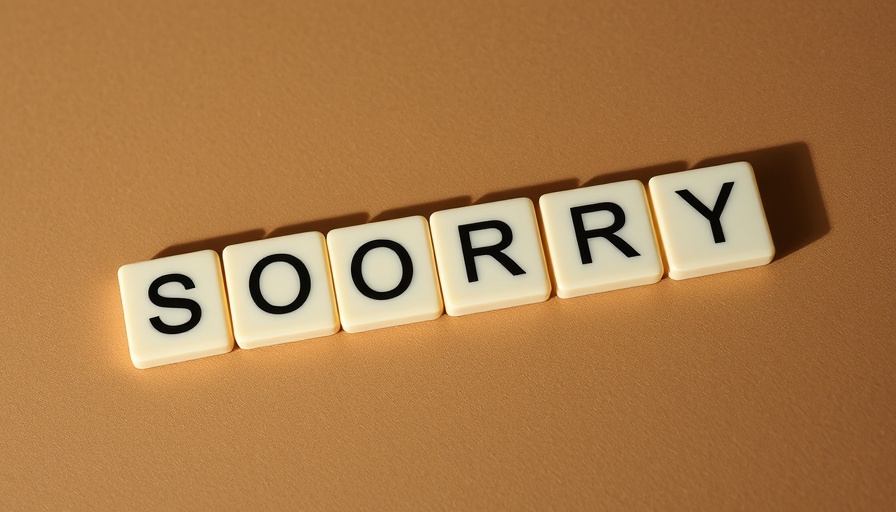
The Healing Power of Forgiveness: More Than Just Letting Go
Forgiveness is a powerful tool that can liberate us from the heavy chains of resentment. When someone hurts us, it’s common to hold onto that pain, allowing bitterness to infiltrate our thoughts and emotions. However, as the saying goes, "Not forgiving is like drinking poison and expecting the other person to die." Grudges not only burden our mental well-being, but they also take a toll on our physical health. Studies have shown that unresolved resentment can elevate blood pressure and foster various stress-related ailments.
Understanding Forgiveness from a Fresh Perspective
At its core, forgiveness is about making a conscious choice to relieve yourself of burdens and negative feelings, rather than endorsing or condoning the other person's actions. This isn’t easy—acknowledging pain often feels daunting. Yet, as mindfulness advocates remind us, it is essential to recognize our feelings. By doing so, we give ourselves permission to experience our emotions fully and begin the healing journey. This acknowledgment could be crucial in not just forgiving others, but also in forgiving ourselves.
Steps to Cultivate Forgiveness in Your Life
Here are some effective strategies you can implement to encourage the practice of forgiveness in your own life:
- Feel Your Pain: Yet, acknowledging pain doesn't mean embracing it forever. Understand the feelings that stem from hurt—be it anger, sadness, or guilt. Ask yourself what you need in those moments and allow space for your emotions.
- Name and Share Your Feelings: Whether through journal writing or conversations with trusted friends or counselors, expressing your emotions is essential. Sharing helps to reduce the intensity of these feelings and can provide unexpected insights.
- Flip Your Focus: Consider the possible struggles and traumas that have led the other person to act in the way they did. This doesn’t justify their behavior, but it allows you to see them through a more compassionate lens.
The Science of Forgiveness
Research supports the healing potential of forgiveness. Studies have shown that simply naming feelings can activate different areas of the brain, leading to reduced emotional distress. When we acknowledge our pain and share it, we invoke a natural process of healing, allowing our rational side to engage more fully. This is an insightful reminder of the mind-body connection and the benefits of cultivating emotional intelligence.
Why Forgiveness is Essential in Today’s World
The modern world continually tests our patience and emotional resilience; conflict, misunderstanding, and hurt feelings are part of our human experience. But the strength to forgive allows us to navigate these challenges with grace. As we foster forgiveness in our lives, we cultivate a sense of peace and inner strength, leading to healthier relationships and improved mental well-being.
Tools and Techniques for Practicing Forgiveness
Forgiveness isn't an overnight process; it requires commitment and patience. Here are a few practical techniques you might consider:
- Meditation and Mindfulness: Engaging in regular mindfulness practices can enhance your capacity for empathy and compassion, creating a fertile ground for forgiveness.
- Journaling: Writing about your feelings allows for self-reflection and can help clarify your thoughts, making it easier to move towards forgiveness.
- Seek Professional Help: Sometimes, the best way to navigate through complex feelings is with the guidance of a trained therapist who can provide support and insight.
Final Thoughts: Taking the First Step Towards Forgiveness
The journey of forgiveness can be a profound and transformative experience. By embracing forgiveness, we not only release ourselves from the shackles of resentment but also open up to the possibilities of joy, peace, and healing. Remember that forgiveness is a personal journey; take your time and allow yourself to grow through this process. Reflecting on how liberating it can be to release these burdens might inspire you to take that first step.
If you’re ready to explore more about enhancing your mental wellness through forgiveness and other mindfulness practices, consider signing up for a course or joining a supportive community that prioritizes emotional health. Your journey towards healing starts now, so why not take action today?
 Add Row
Add Row  Add
Add 



Write A Comment